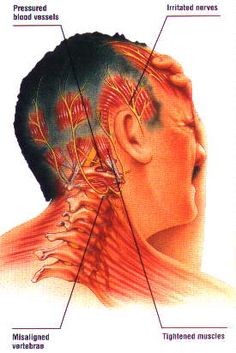Herniated disc, also referred to as a slipped or ruptured disc, may occur anywhere in the spine, although it most often happens in the neck or lower back.

How & Why Do Herniated Discs Develop?
Our discs, which are composed of a thick outer fibrous ring and an inner gel-like substance, act as shock absorbers. They are located between the vertebrae that make up the spinal column. The discs are soft and allow our backs to bend. Our discs have a high water content when we are young, but as we grow older the amount of water content decreases, which causes the discs to become less pliable.
Disc protrusion or bulge is a condition in which the outermost layers of the fibrous ring can bulge when the disc is under pressure where none of the central portion escapes beyond the outer layers. when the fibrous ring develops a defect or tear, the gel substance can be forced out, causing the disc to bulge out or herniate, beyond the damaged outer rings, and thus putting pressure on the nerves. The tear in the disc ring may result in the release of inflammatory chemical mediators which may cause severe pain.
Some contributing factors that can increase the risk of weakening or damaging our discs include:
• Age
• History of back injuries
• Long periods of sitting
• Lifting heavy objects
• Repetitive motion
• High impact athletic activities
• Smoking
• Excessive body weight
• Heavy physical exertion
Symptoms
There are many symptoms of a herniated disc, depending on the location of the injured disc. Some symptoms you may experience include:
• Pain traveling down a leg or arm because of pressure or irritation to nerve root.
• Tingling “pins-and-needles” sensation or numbness in the leg or arm
• Pain in the front of the thigh or shoulder
• Weakness in your leg or arm
• Deep muscle pain and muscle spasms
Diagnosis
Accurate diagnosis of the source of pain is important to successfully treat a herniated disc. Orlando Pain & Spine Center can provide you with a diagnosis, which begins with:
• Thorough clinical evaluation
• Complete medical history, analysis of your symptoms, and physical examination
• Additional testing, such as MRIs, X-rays, CT scans, or EMG
• Selective nerve root block to determine the origin of your pain when there is discrepancy between MRI and symptoms
Treatment
In the majority of cases, spinal disc herniation does not require surgery. Initial treatment usually consists of Non-steroidal anti-inflammatory drugs, pain medications, physical therapy and epidural steroid injections.
Surgery is indicated when there is a significant pain, leg or arm weakness, loss of bowel or bladder control.
